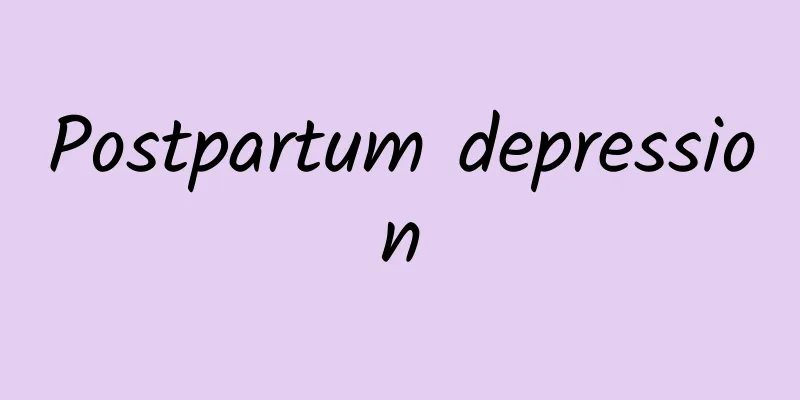Postpartum depression

|
For many women after childbirth, there will be a series of changes in their physical, psychological, and even social roles. Therefore, many female friends will experience symptoms and phenomena such as irritability and excessive mood swings after giving birth. These various phenomena are called postpartum depression. So what are the clinical manifestations of postpartum depression? In fact, postpartum depression is one of the more common diseases. Generally speaking, some women will experience it within the sixth week after giving birth, some will recover before the child goes to school, and in severe cases, it may even last for more than 1 to 2 years. Pregnancy again can also lead to recurrence of the disease. Postpartum depression Postpartum depression is the most common type of mental disorder in women. It is a series of physical, emotional, and psychological changes caused by sex hormones, social roles, and psychological changes after women give birth. Typical postpartum depression occurs within 6 weeks after delivery and can last throughout the entire postpartum period, and some even last until the child goes to school. The incidence of postpartum depression is between 15% and 30%. Postpartum depression usually develops within 6 weeks and can recover on its own in 3 to 6 months, but severe cases may last for 1 to 2 years. The recurrence rate is 20% to 30% in the next pregnancy. Causes 1. Perfectionist personality: Because perfectionist women have unrealistic expectations of being a mother after childbirth and are unwilling to seek help when they encounter difficulties, they may not be able to adapt to being a new mother. 2. Having emotional fluctuations during pregnancy: Severe emotional fluctuations during pregnancy, such as moving, the death of relatives or friends, or war, etc., can make pregnant women more susceptible to postpartum depression. 3. Endocrine: During the process of pregnancy and childbirth, the endocrine environment in the body undergoes great changes, especially within 24 hours after delivery. The sharp changes in hormone levels in the body are the biological basis for the occurrence of postpartum depression. 4. Genetics: There is a family history of mental illness and a high incidence of postpartum depression. Family heredity may affect a woman's susceptibility to depression. 5. Body: Mothers with physical illness or disability may develop postpartum depression, especially infection or fever, which may have a certain impact on the onset of postpartum depression. In addition, the susceptibility of central nervous system function and the influence of emotion and motor information processing and regulation system (such as dopamine) may be related to the occurrence of postpartum depression. Clinical manifestations 1. Mood changes: The most prominent symptom of the patient is persistent depression, manifested as gloomy expression, listlessness, drowsiness, easy tears and crying. Patients often feel depressed and gloomy, and often lose their temper over trivial matters. 2. Cognitive changes: Patients lack interest in daily activities, do not experience pleasure in various entertainment or pleasant things, and often feel inferior, self-blame, and guilt. I often feel that my brain is slow to react and it is difficult to think about problems. Always think of the worst when things happen, lose confidence in life, and think that the future is bleak. 3. Changes in will and behavior: The patient's will activity is reduced and it is difficult for him to concentrate on his work. They want to socialize, but lack the courage and confidence to do so. The patient behaves passively and overly dependent in every aspect, and the psychological problem lies in his unwillingness to take responsibility. 4. Physical symptoms: Seek medical help mainly due to physical symptoms such as insomnia, headache, body pain, dizziness, blurred vision, tinnitus, etc. These symptoms often give the body a feeling of being numerous and changeable, and some symptoms can exist for a long time without obvious aggravation or relief. I believe everyone has some knowledge and understanding about postpartum depression. In fact, many times female friends often become depressed, or even feel self-blame and inferiority because they cannot adapt to the role of mother quickly. Therefore, during the period after delivery, postpartum women need more love and care from their families and husbands to prevent the occurrence of postpartum depression. |
<<: Symptoms of vitreous opacities
Recommend
The "small actions" after falling asleep actually exposed big problems
One third of our life is spent sleeping. Good qua...
How to exercise arm muscles? Arm muscle training method
Fitness is always inseparable from some exercise,...
Is the meat loose because of fat or water?
People's metabolism will become slower as the...
What Chinese patent medicine should I take for liver yang deficiency?
If liver yang deficiency occurs, people often hav...
What causes frequent acid reflux and bloating?
Acid reflux and bloating are indeed very uncomfor...
Is there fetal movement at ten weeks of pregnancy?
Most pregnant women will feel very happy when the...
What causes pain in left arm?
Arm pain is a very common phenomenon in daily lif...
What causes lung heat?
Lung heat may be caused by long-term improper die...
If you love to do something while sleeping, you will definitely become a fool
Some people like to sleep with a blanket covering...
What should I pay attention to after the palace cleaning?
Generally, abortion surgery requires uterine cure...
Can the wood of the heart strengthen male sexual function?
Men all hope to have stronger sexual abilities, s...
What to do if a four-year-old has diarrhea
A child's body is very fragile, especially a ...
Hemorrhoids outside the buttocks
Hemorrhoids are a very common disease. Because ev...
Why does my vulva suddenly itch after sex?
There are many reasons for vulvar itching after i...
Coccyx pain is more common in women, what is the reason
Coccyx pain refers to a strong tingling sensation...









